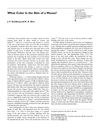 29 citations,
March 2001 in “Clinics in Dermatology”
29 citations,
March 2001 in “Clinics in Dermatology” Steven Kossard classified lymphocyte-related hair loss into four patterns, each linked to different types of baldness.
[object Object]  21 citations,
November 2011 in “Veterinary Pathology”
21 citations,
November 2011 in “Veterinary Pathology” Mouse skin color ranges from pink to black, depending on their hair growth cycle.
 13 citations,
August 2020 in “Frontiers in Cell and Developmental Biology”
13 citations,
August 2020 in “Frontiers in Cell and Developmental Biology” Twist1 helps maintain important features of cells crucial for hair growth by working with Tcf4 and β-catenin.
 11 citations,
May 2003 in “Obstetrics and gynecology (New York. 1953. Online)/Obstetrics and gynecology”
11 citations,
May 2003 in “Obstetrics and gynecology (New York. 1953. Online)/Obstetrics and gynecology” Hirsutism in women often indicates a hormonal imbalance and can be managed with a combination of hormonal treatments and hair removal methods.
 9 citations,
October 2018 in “Journal of Cosmetic and Laser Therapy”
9 citations,
October 2018 in “Journal of Cosmetic and Laser Therapy” Using methods like lasers and microneedling with drugs can improve hair regrowth for alopecia, but more research is needed on safety and best practices.
 8 citations,
July 2014 in “Anais Brasileiros de Dermatologia”
8 citations,
July 2014 in “Anais Brasileiros de Dermatologia” A man's scalp condition was misidentified as hair loss dots but was actually a common follicular disorder.
 8 citations,
September 2010 in “Journal of Men's Health”
8 citations,
September 2010 in “Journal of Men's Health” Androgenic Alopecia, a common hair loss condition, can be effectively treated with finasteride and other treatments.
 8 citations,
November 1990 in “International Journal of Dermatology”
8 citations,
November 1990 in “International Journal of Dermatology” Albendazole may cause hair loss.
 7 citations,
June 2021 in “Cell Proliferation”
7 citations,
June 2021 in “Cell Proliferation” Low oxygen levels improve the function of hair and skin cells when they are in direct contact.
 7 citations,
July 2019 in “Clinics in Dermatology”
7 citations,
July 2019 in “Clinics in Dermatology” Hair loss can indicate or worsen with systemic diseases, and treating the underlying condition is important.
 2 citations,
September 2014 in “Journal of The American Academy of Dermatology”
2 citations,
September 2014 in “Journal of The American Academy of Dermatology” Obesity may worsen hair loss in men and increase hirsutism in overweight or obese individuals, with weight loss recommended for treatment.
 April 2017 in “Journal of Investigative Dermatology”
April 2017 in “Journal of Investigative Dermatology” Certain microRNAs may protect against hair loss in alopecia areata and could be potential treatment targets.
 August 2016 in “Journal of Dermatology”
August 2016 in “Journal of Dermatology” A chemical called 5-Bromo-2′-deoxyuridine caused rapid hair loss in mice by killing certain skin cells through a specific cell death pathway.
 May 2009 in “The American Journal of Dermatopathology”
May 2009 in “The American Journal of Dermatopathology” Mast cells play a significant role in hair loss conditions like male pattern hair loss and alopecia areata.
 April 2021 in “Journal of Investigative Dermatology”
April 2021 in “Journal of Investigative Dermatology” Cyclooxygenase-2 overexpression in mice skin causes hair loss like human androgenetic alopecia.
 April 2012 in “Informa Healthcare eBooks”
April 2012 in “Informa Healthcare eBooks” AGA is a common hair loss affecting both genders, treated with various therapies to promote regrowth and slow thinning.
 172 citations,
November 1983 in “Journal of The American Academy of Dermatology”
172 citations,
November 1983 in “Journal of The American Academy of Dermatology” Chemotherapy can cause skin problems like hair loss, mouth sores, and skin darkening, and recognizing these can affect treatment decisions.
 141 citations,
January 1984 in “Journal of The American Academy of Dermatology”
141 citations,
January 1984 in “Journal of The American Academy of Dermatology” Pregnancy can cause skin darkening, varicose veins, more sweating, hair growth, hair loss after birth, nail changes, and gum inflammation.
 87 citations,
July 2018 in “Nursing Clinics of North America”
87 citations,
July 2018 in “Nursing Clinics of North America” PCOS is a common hormonal disorder in women, marked by symptoms like hair growth and menstrual issues, and requires personalized treatment.
 86 citations,
May 2008 in “Cytokine & growth factor reviews”
86 citations,
May 2008 in “Cytokine & growth factor reviews” TNF family proteins are crucial for the development of skin features like hair, teeth, and mammary glands.
[object Object]  82 citations,
February 2017 in “Cold Spring Harbor Perspectives in Biology”
82 citations,
February 2017 in “Cold Spring Harbor Perspectives in Biology” The TGF-β family helps control how cells change and move, affecting skin, hair, and organ development.
 67 citations,
September 2008 in “Dermatologic therapy”
67 citations,
September 2008 in “Dermatologic therapy” Hirsutism is excessive hair growth in women often caused by polycystic ovarian syndrome, and identifying the cause is important for managing associated health risks.
 54 citations,
May 1998 in “Urology”
54 citations,
May 1998 in “Urology” Men with enlarged prostates often have more severe baldness.
 48 citations,
March 1997 in “Veterinary Dermatology”
48 citations,
March 1997 in “Veterinary Dermatology” Some cats with sudden hair loss and tiredness might have cancer-related alopecia.
 40 citations,
November 2009 in “Experimental Dermatology”
40 citations,
November 2009 in “Experimental Dermatology” The mineralocorticoid receptor may play a role in skin and hair health and could be a new target for treating related disorders.
 40 citations,
January 1996 in “Journal of Dermatological Treatment”
40 citations,
January 1996 in “Journal of Dermatological Treatment” Antimicrobial lotion reduces inflammation and increases hair density in hair loss patients.
 29 citations,
January 2019 in “Journal of the European Academy of Dermatology and Venereology”
29 citations,
January 2019 in “Journal of the European Academy of Dermatology and Venereology” Trichoscopy is useful for diagnosing and monitoring systemic lupus erythematosus, with certain hair and scalp changes indicating more active disease.
 28 citations,
October 2017 in “Journal of Cosmetic and Laser Therapy”
28 citations,
October 2017 in “Journal of Cosmetic and Laser Therapy” Combining electrodynamic microneedle with 5% minoxidil improves hair growth and reduces hair loss in Chinese men.
 21 citations,
January 2020 in “General and Comparative Endocrinology”
21 citations,
January 2020 in “General and Comparative Endocrinology” Lack or blocking of SRD5a, a key component in hormone creation, can lead to conditions like pseudohermaphrodism and affect hair growth, bone mass, muscle strength, and reproductive health. More research is needed on its regulation from fertilization to adulthood.
 21 citations,
November 2010 in “Journal of molecular medicine”
21 citations,
November 2010 in “Journal of molecular medicine” FoxN1 gene is essential for proper thymus structure and preventing hair loss.






























